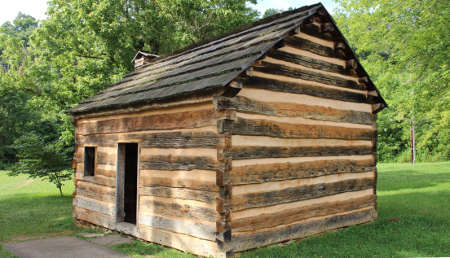Advanced level English - USA
Advanced EFL / ESL reading resource
Log Cabins and the White House
 A
reproduction of the kind of one-room log-cabin in which President
Abraham Lincoln was born - at the Lincoln birthplace national historic
site. The original cabin disappeared centuries ago.
A
reproduction of the kind of one-room log-cabin in which President
Abraham Lincoln was born - at the Lincoln birthplace national historic
site. The original cabin disappeared centuries ago.Among other recent presidents, both Barack Obama and Ronald Reagan, but not Donald Trump nor George W Bush, were men who made their way up to the presidency from fairly simple origins. Reagan became known first as a minor Hollywood star; his screen image, as a tough cowboy, at home in the saddle and in log cabins, undoubtedly helped him in his original struggle for the Republican nomination and the presidency.
Since the start of the nineteenth century, candidates for the American presidency have taken pride in demonstrating the humble roots from which they have come; the image of the "log cabin" became symbolic of humble proletarian origins, at a time when the United States were beginning to move west and occupy new territory, and home-built log cabins were the only form of housing available for the pioneering homesteaders.
Abraham Lincoln
 Abraham
Lincoln.
Abraham
Lincoln.The story of Abraham Lincoln's childhood is one of the great classics of the American Dream; Lincoln spent his childhood years in a variety of log cabins, as his father moved from place to place, advancing slowly westwards. In the winter of 1816-17, the Lincolns lived in a "half-faced camp", a log cabin which was totally open on one side, in an "unbroken forest" in the heart of almost uninhabited Indiana.
While quite a few other American presidents have come up from humble roots, some others whose roots were somewhat more privileged have willingly disguised the fact.
The classic example was William Harrison, who was elected president in 1840. Harrison campaigned for the presidency using a specially-written theme tune called the Log Cabin March; indeed, his whole campaign was won with the slogan "log cabin and hard cider".... but the tune and slogan were just marketing gambits, neither of which had anything to do with reality! Harrison was actually a man with whom few Americans had much affinity, since he was a prosperous Virginia landowner, whose father was one of the signatories of the Declaration of Independence.
Ironically, Harrison's attempts to portray himself as a tough man of the people got him nowhere; standing with neither hat nor coat during his inauguration ceremony on a bitter winter's day in 1841, he caught pneumonia and died a month later.
In more recent times, Jimmy Carter, the Democratic president from 1977 to 1981, was also portrayed as a "country boy", and was popularly known as the peanut farmer from Plains, Georgia. The fact that he was actually the owner of a very large and prosperous farm and a string of family businesses, rather than a simple homesteader, was often conveniently forgotten by those who wanted the president to seem like a simple man with simple roots.
Naturally, there are many people in America who yearn nostalgically for a return to old ways; but in today's mediatized world, where image is everything, and money buys the time and the TV and social media ads without which images cannot be built, it is hard to imagine the clock being put back. Besides, although many poor Americans still live in small wooden houses, few of those who do go on to become politicians. The age of the log-cabin-raised president is definitely over.
WORDS:
bitter: very cold - convenient: useful - gambit: strategy - homesteader: person establishing a new home or firm in new virgin territory - log: cut trunk or large branch of a tree - saddle: seat on the back of a horse - skills: abilities - string: chain, group - take pride in: be proud of - theme tune: anthem - willingly: happily - yearn: hope.
Copyright © Linguapress renewed 2025. Do not copy this document to any other website
Copying permitted for personal study, or by teachers for use with their students
WORKSHEET - print or use online
Log cabins and the White House
Words and endings -
Complete the missing endings where necessary in these extracts from the article: take care, some endings are grammatical, others just test your spelling or your vocabulary.:
The story of Abraham Lincoln's child is one of the great classics of the American Dream; Lincoln spen his child years in a vari of log cabins, as his father moved from place to place, advan slowly west In the winter of 1816-17, the Lincolns lived in a "half-faced camp", a log cabin which was tota open on one side, in an "unbr forest" in the heart of almost uninh Indiana.
Relative pronouns and adjectives
Choose the correct relative pronouns and adjectives or pronoun phrases where required in these extracts from the articleThen in the year 2000, the man was chosen as the 43rd American president was not someone had come from nowhere and made it to the top by his own skills and determination, but a man from a very privileged background. George Bush Jr. came from an illustrious family background, being the son of President George Bush Sr., and grandson of a US senator..... is the US equivalent of royalty.
Naturally, there are many people in America yearn nostalgically for a return to old ways; but in today's mediatized world, image is everything, and money buys the time and the TV and social media ads images cannot be built, it is hard to imagine the clock being put back. Besides, although many poor Americans still live in small wooden houses, few of do go on to become politicians. The age of the log-cabin-raised president is definitely over.
Comprehension questions
Choose the correct answer from the four options given, for each of the following questions based on the article.This exercise is from https://linguapress.com/advanced/log-cabins.htm © Linguapress.com
Question 1: What is the "log cabin" symbolic of in the context of American presidential history?
a) Wealth and privilege b) Humble beginnings and working-class roots c) Intellectual prowess and education d) Military experience and leadership.Question 2: Who was the only president who could genuinely claim to have been born in a log cabin?
a) Bill Clinton b) Ronald Reagan c) Abraham Lincoln d) William Harrison.Question 3: How did Ronald Reagan's Hollywood image contribute to his political career?
a) It made him seem untrustworthy and out of touch. b) It helped him project a tough, human image fitting the "log cabin" ideal. c) It made him seem more American than other presidents. d) It emphasized his experience in dealing with complex issues.Question 4: What was the "log cabin and hard cider" slogan associated with?
a) Abraham Lincoln's presidential campaign b) William Harrison's presidential campaign c) Jimmy Carter's presidential campaign d) George W. Bush's presidential campaign.Question 5: What was ironic about William Harrison's presidential campaign?
a) He was a skilled speaker but lost the election due to his lack of political experience. b) He portrayed himself as a man of humble origins despite being from a wealthy family. c) He was a successful businessman but lost the support of working-class voters. d) He was a military hero but lost the election due to his unpopular policies.Question 6: How was Jimmy Carter often portrayed during his presidency?
a) As a wealthy businessman b) As a sophisticated intellectual c) As a simple, country boy d) As a powerful military leader.Question 7: What is the main point made about George W. Bush's background?
a) He was a self-made man who rose from humble beginnings. b) He was from a family with a long history of public service and privilege. c) He was a popular figure who easily won the support of the electorate. d) He was a skilled politician who was well-prepared for the presidency.Question 8: What does the article suggest about the future of presidents with "log cabin" origins?
a) It is likely that future presidents will continue to be from humble backgrounds. b) It is becoming increasingly difficult for individuals from humble beginnings to reach the presidency. c) The image of a candidate's background is no longer important in elections. d) The media has little influence on how candidates are perceived by voters.Question 9: Why did Bill Clinton's early life resemble the "log cabin" myth?
a) He lived in a grand mansion. b) He had a wealthy and influential father. c) He was raised in a simple, working-class home. d) He was a truck driver before becoming a politician.Question 10: What does the phrase "mediatized world" suggest in the article's conclusion?
a) A world where the media has little influence on politics. b) A world where image and presentation are highly valued. c) A world where political campaigns are inexpensive. d) A world where traditional values are still dominant.Ideas for teachers :
After students have read this article, ask them to talk (or write) about each of the seven presidents mentioned in the article, or to choose one of the presidents mentioned, and write a paragraph about him - if necessary using information from the Internet.
Language points :
Points to watch in this article include notably relative clauses particularly those introduced by a preposition (in which...) or by those (those who...) . Note the uses of neither and both. Also note two common idioms, to be born with a silver spoon in one's mouth, and to put the clock back. Can students suggest what these expressions mean ?Relative pronouns and adjectives
This article contains in all over twenty examples of relative pronouns or adjectives, covering a variety of forms: who, whom, whose, which, preposition+which, and the nominal relative pronouns where and when.. Note the collocations that appear in the multiple choice exercise - neither of which and those who.For a clear explanation of the use of relative pronouns and adjectives, and nominal relative pronouns, see A Descriptive Grammar of English section 2.4.3..
Comprehension questions. 1 b, 2c, 3b, 4b, 5b, 6c, 7b, 8b, 9c, 10 b.
Note: these comprehension questions are different from the comprehension questions included in the complementary IELTS-style reading test to accompany this article
© linguapress.com




 Copyright
information.
Copyright
information.